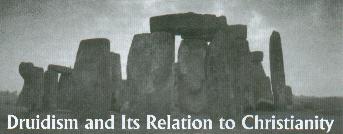DRUIDISM AND ITS RELATION TO CHRISTIANITY
FOR a delightful and instructive account of the times of the Britains, read Stonehenge; or, The Romans in Britain. A Romance of the Days of Nero (Bentley, London, 1844.) To it is annexed an essay on Druidism, in which the Egyptian and Phoenician mythologies are discussed in relation thereto, and the whole narrative is also supported by numerous notes. Blackie ‘s Comprehensive and most of the large Histories of England contain good summaries, and in Dr Oliver’s Masonic works will be found many interesting notes bearing on the ancient faith. In the Lichfield Diocesan Churchman for July, 1874, appeared a capital paper on this subject, two quotations from which I subjoin, as they state well-founded opinions in a few words: – “But what about the ‘wild Olive’ which grew in Britain before it was grafted in upon the Gospel tree? It was Druidism, a branch of the old primeval Church. It was brought here, learned men suppose, about the time of Abraham. And having once come into the island, here it forthwith took root; and flourished so vigorously that the ancient Britons never lapsed into the gross polytheism and degraded superstition of their Continental neighbours.” … “But the most remarkable features of Druidism were those which fitted it to be a preparation of the Britons for the reception of the Gospel. Strange to say, whilst believing that the essence of the Supreme Being was ‘pure mental light,’ whose real name and nature were an ineffable mystery, – they taught that He presented Himself to the human mind in a triple aspect, of creator as to the past, saviour or conserver as to the present, and renovator or recreator as to the future. This was the Druidic Trinity, the three aspects of which were named BeIi, Taran, and Esu, or Yesu. When Christianity preached Jesus as God, it preached the most familiar name of its own Deity to Druidism; and in Welsh, the ancient British language, Jesus has never assumed its Greek, Latin, or Hebrew form, but still remains the pure Druidic Yesu. It is singular that the ancient Briton has never changed the name of the God he and his forefathers worshipped, nor has he ever worshipped but one God.”
M. Barbe, in his work La Verite sur la Langue d’Oc, quotes the authority of Origen in proof of these characteristics of the Druids. Again, in the Derby Churchman of 1872, an article on “How the Gospel Caine into Derbyshire,” commences with the following: “We must remember that, although England was Christianised by messengers from Palestine soon after our Lord’s Ascension, hordes of Pagan Saxons from the Continent swept all the old British Christianity away into Ireland and the Scotch Isles, where the holy religion still flourished in beauty and purity. From thence their holy men, like Aidan, and Chad, Bishop of Lichfield, and his brother Cedd, Bishop of London, came a-foot and reconverted the country. About the same time a band of monks from Rome, under Augustine, arrived at Canterbury. And history shows us that whilst the brave Britons from Iona did most towards re-converting the land, the Roman party – then of pure Christian faith – reoganised it.”
That the Druids were of a superior race of foreign extraction, and possessed of a civilization greatly superior to that of the general community, is certain (see Comprehensive History of England); and the theory of their Hebrew and Egyptian origin is supported by the affinity of language and customs. Respecting a Druid collar or gorget of gold found in Ireland, the History referred to above has the following note:
“This article, called also Jodhan Morain, is supposed to have been worn on the neck of the judge when on the bench, and it was believed it would choke him if he gave unjust judgment. Some authorities say that it was called Morain from a great judge of that name, who formerly flourished in Ireland. ‘My surprise,’ says Governor Pownall (Early Irish Antiquities, Archaeologia, vol 7), ‘was great when I found in Buxtorf, that Jodhan Morain was the Chaldee name for Urim and Thummim. Not satisfied with Buxtorf, I wrote to the learned Rabbi Heideck, now in London; his answer was satisfactory, and contained a dozen quotations from various commentators.”
From: Israel and England Their Place and Work Among the Nations 1889


